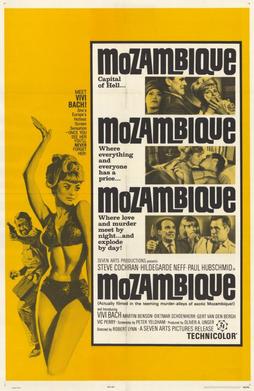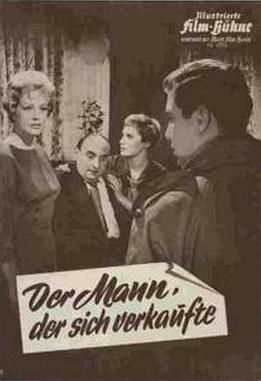
Hildegard Frieda Albertine Knef was a German actress, singer, and writer. She was billed in some English-language films as Hildegard Neff or Hildegarde Neff.

Silk Stockings is a musical with a book by George S. Kaufman, Leueen MacGrath, and Abe Burrows and music and lyrics by Cole Porter. The musical is loosely based on the Melchior Lengyel story Ninotchka and the 1939 film adaptation it inspired. It ran on Broadway in 1955. This was the last musical that Porter wrote for the stage.

Alraune, later renamed Unnatural: The Fruit of Evil, is a 1952 black and white West German science fiction film, directed by Arthur Maria Rabenalt and starring Hildegard Knef and Erich von Stroheim. The film is based on the 1911 novel Alraune by German novelist Hanns Heinz Ewers. The plot involves a scientist who creates a woman (Knef) who is beautiful yet soulless, lacking any sense of morality.

The Sinner is a 1951 West German romantic drama film directed by Willi Forst and starring Hildegard Knef, Gustav Fröhlich and Änne Bruck. It was shot at the Bendestorf Studios and on location in Naples, Rome and Positano. The film's sets were designed by the art director Franz Schroedter.

Mozambique is a 1964 British drama film directed by Robert Lynn from a screenplay by Peter Yeldham, starring Steve Cochran in his final film role, Hildegard Knef, Paul Hubschmid and Vivi Bach.

Subway in the Sky is a 1959 British crime film directed by Muriel Box and starring Van Johnson, Hildegard Knef and Albert Lieven. Hildegard Knef, who changed career in the 1960s to become a cabaret singer and songwriter, sings one song in the film, "It Isn't Love." It was shot at Shepperton Studios near London. The film's sets were designed by the art director George Provis.
Hilde is a 2009 German biographical film directed by Kai Wessel and starring Heike Makatsch, Dan Stevens and Monica Bleibtreu. It depicts the life of the German actress Hildegard Knef.

Everyone Dies Alone / Alone in Berlin is a 1976 West German drama film adapted from the Hans Fallada novel Every Man Dies Alone. The book was based on the story of two ordinary Germans, Otto and Elise Hampel, who committed acts of civil disobedience against the Third Reich, were caught and sentenced to death.

Between Yesterday and Tomorrow is a 1947 German drama film directed by Harald Braun and starring Hildegard Knef, Winnie Markus and Sybille Schmitz.

Nights on the Road is a 1952 West German crime drama film directed by Rudolf Jugert and starring Hans Albers, Hildegard Knef, Marius Goring and Lucie Mannheim. It was produced by the veteran Erich Pommer who had returned to Germany after years of exile. It is one of the more prominent German film noirs. It was acclaimed by German critics on its release and was awarded a prize at the Berlin Film Festival. It was shot at the Bavaria Studios in Munich and on location in Frankfurt and various autobahns. The film's sets were designed by Rudolf Pfenninger and Ludwig Reiber. The production budget was around 900,000 deutschmarks.

The Man Who Sold Himself is a 1959 West German crime film directed by Josef von Báky and starring Hildegard Knef, Hansjörg Felmy and Antje Weisgerber.

Film Without a Title is a 1948 German comedy film directed by Rudolf Jugert and starring Hans Söhnker, Hildegard Knef and Irene von Meyendorff. It was made by Bavaria Film at the Emelka Studios in Munich in the American Zone of Occupation. Location shooting took place around Lüchow-Dannenberg in Lower Saxony. The film's sets were designed by the art directors Robert Herlth and Max Seefelder.

Illusion in a Minor Key is a 1952 West German drama film directed by Rudolf Jugert and starring Hildegard Knef, Sybille Schmitz and Hardy Krüger. It was made at the Bavaria Studios in Munich. It was one of the last films produced by the veteran Erich Pommer who had returned to Germany from exile after the Second World War. The film's sets were designed by Ludwig Reiber. It is sometimes included on lists of film noirs.

Miracles Still Happen is a 1951 West German romantic comedy film directed by Willi Forst and starring Forst, Hildegard Knef and Marianne Wischmann. It was intended by Forst as a less risqué follow-up to his controversial The Sinner which had also starred Knef. It was shot at the Bendestorf Studios and on location in Hamburg, Bavaria and Austria. The film's sets were designed by the art director Franz Schroedter and Karl Weber.

Knef is a studio album by German actress and singer-songwriter Hildegard Knef. It was released in February 1970 on Teldec's Decca Records and Stern Musik, a music branding division of the magazine Stern.

The Noltenius Brothers is a 1945 German drama film directed by Gerhard Lamprecht and starring Willy Birgel, Karl Mathias and Hilde Weissner. Released in Berlin on 7 April, it was, by most accounts, the last of the twelve films released in Nazi Germany in 1945, before capitulation on 7 May.

Condemned to Sin is a 1964 West German drama film directed by Alfred Weidenmann and starring Martin Held, Hildegard Knef and Heidelinde Weis.

Confession Under Four Eyes is a 1954 West German crime drama film directed by André Michel and starring Hildegard Knef, Carl Raddatz and Ivan Desny. It was shot at Göttingen Studios and on location in Hamburg and a displaced persons camp near Nuremberg in Bavaria. The film's sets were designed by the art directors Ernst H. Albrecht and Paul Markwitz.
Journey to Happiness is a 1948 German romantic drama film directed by Erich Engel and starring Käthe Dorsch, Rudolf Forster and Hildegard Knef. It was made at the Babelsberg Studios in Berlin while location shooting took place around the Attersee (lake) in Austria.The film's sets were designed by the art director Erich Kettelhut. It was one of a significant number of films produced during Nazi Germany but not released until after the fall of the Nazi regime. It was originally made in 1944 during the Second World War, but its release was delayed by four years before it eventually premiered in the Soviet Zone.

Escape from Sahara is a 1958 West German adventure drama film directed by Wolfgang Staudte and starring Hildegard Knef, Bernhard Wicki and Hannes Messemer. It was shot at the Tempelhof Studios in Berlin with location shooting taking place in Cuxhaven and in Tangier in North Africa. The film's sets were designed by the art directors Andrej Andrejew, Fritz Lippmann and Helmut Nentwig. It was part of an upsurge of popular interest in West Germany about France's War in Algeria, particularly Germans serving there.


















